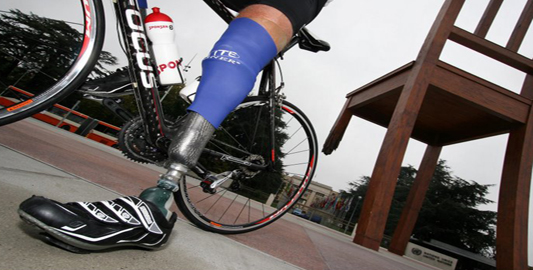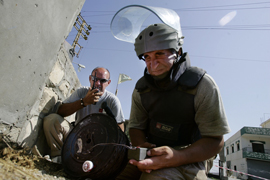Landmine marathon
Double amputee cycles across 14 countries against landmines.

 |
| Kohli, a double amputee, cycles about 120km a day [Patrick Grob] |
When Armin Kohli arrives at the banks of the Dead Sea in Jordan this week, he will have cycled 4,800km on a tour that began in Geneva, Switzerland, in the hope of raising awareness of the dangers of landmines.
Kohli, who has dedicated four years to raising awareness, has cycled through 14 countries in 48 days. It is no small feat, particularly for Kohli, who is a double amputee.
Provided with artificial limbs after losing both legs in a train accident when he was 15, the 41-year-old Swiss cyclist hopes to revive what he says is declining media attention to the continuing fatalities caused by anti-personnel weapons ahead of the eighth annual meeting of state parties signed to the Ottawa Convention against landmines.
This year’s convention is to be held in Jordan on November 18.
Kohli told Al Jazeera: “The issue of landmines is not so controversial like female suicide bombers, but the reality is that most of the victims of landmines are children and civilians.”
According to the latest landmine monitor report from the International Campaign to Ban Landmines (ICBL), released last week, nearly 30 per cent of the 5,751 victims of landmines in 2006 were children.
Three-quarters of all victims were civilians.
Trekking through minefields
Since the beginning of October, Kohli has cycled an average 120km a day – resting on every seventh day. He has had no companions along for the ride, apart from two associates that drive ahead and help with logistics.
 |
| Armed movements are said to heavily use landmines [GALLO/GETTY] |
“Cycling is extreme and really mental. I have spent hours training [for] the mental part,” he said.
Kohli’s route took him from Switzerland to the Balkans, where Bosnian, Croatian and Serbian forces resorted to the use of landmines during the civil war between 1993 and 1996.
Nearly 10 years after a UN-sponsored peace settlement in the disputed region, most landmine fields have yet to be cleared.
From there, Kohli crossed the Greek-Turkish border, where civilians from both sides recounted stories of losing loved ones to landmines.
In southern Lebanon, victims of cluster bombs and landmines told Kohli of their continuing struggle to clear what were battlefields, where many farmers and school children cross on their way to market or schools.
In 2006, the Israeli air force dropped at least four million cluster bombs over the south of the country, a quarter of which failed to detonate on impact.
Middle East fatalities
Dalya Farran, spokesperson for the UN Mine Action Coordination Center in South Lebanon, told Al Jazeera that since the August 14, 2006 ceasefire, “212 civilians have been injured – 25 fatally – from cluster bombs and landmines”.
Last month, a six-year-old shepherd and a British de-mining supervisor were killed when they stepped on cluster bombs.
The immediate work to locate and destroy cluster bombs – which are not covered by the Ottawa Convention – has halted UN efforts to clear at least 375,000 landmines leftover from the Israeli occupation of South Lebanon between 1992 and 2000.
| It’s important to think before you use a weapon. Target your enemy, don’t target your own people.” Armin Kohli, landmine awareness campaigner |
But Jordan, Kohli’s final destination, has made significant progress in locating and removing landmines which have dotted the border with Israel since 1967.
In 2006, Jordan successfully cleared 50,000 Israeli-laid landmines in the south of the country.
According to the website of the National Committee for Demining and Rehabilitation (NCDR), “based on military estimates, there were roughly 305,000 mines laid on Jordanian territory. Of this number, 73,000 were Israeli and 232,000 were Jordanian”.
“Between 1993 and 2006, more than 125,000 landmines have been removed.”
Israel and Jordan signed a peace treaty in 1994.
Seeking worldwide bans
Currently, 155 countries have signed the Ottawa Convention – officially titled The Convention on the Prohibition of the Use, Stockpiling, Production and Transfer of Anti-Personnel Mines and on Their Destruction – but many countries in the Middle East have not.
The US, the United Kingdom, Russia and China have also not signed the pact.
While Kohli said he knows a one-man tour will not change government policies overnight, he hopes to contribute to the “moral pressures” facing non-signatories.
Major countries, he said, are no longer producing landmines in bulk and trade has decreased significantly.
But some of the largest users of landmines are armed movements such as the Revolutionary Armed Forces of Columbia (Farc), the Tamil Tigers in Sri Lanka or the Kurdistan Workers’ party (PKK) in Turkey.
Kohli said: “I’m not a judge. Liberation movements have their goals but there are other weapons. It’s important to think before you use a weapon. Target your enemy, don’t target your own people.”
Not a charity
Receiving funding and support from the Swiss government and the Swiss Campaign to Ban Landmines as well as smaller donors, Kohli says he will continue cycling and pushing the issue but does not want to be seen as charity.
“I’m not a charity campaign. I want to struggle in a political way. My solidarity is with the landmine victims,” he told Al Jazeera.
For Kohli, who spent nearly two years learning to walk again with prosthetic limbs, cutting production of landmines is not enough.
“Being disabled does not mean [landmine victims] cannot a have a normal life, they just need to recieve proper assistance. Governments must reach out to the victims and support them.”